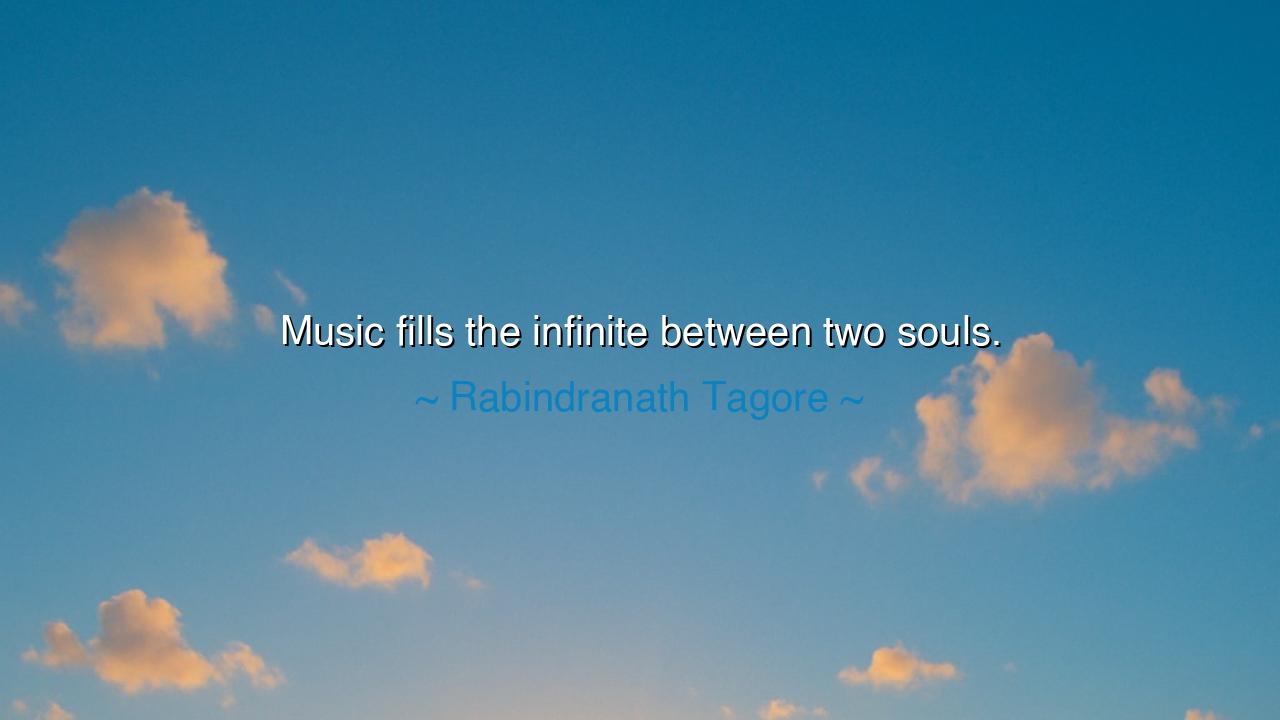
Music fills the infinite between two souls.






The words of Rabindranath Tagore—“Music fills the infinite between two souls.”—resound like a whisper carried on the eternal wind. They remind us that there are distances which words cannot cross, silences too vast for speech to bridge. But in those spaces, music flows like a river of light, weaving hearts together, making the invisible bond between beings audible and alive. The poet of India, philosopher and mystic, Tagore spoke as one who had tasted the divine, and he knew that music is not merely sound—it is communion.
Tagore was himself a composer, as well as a poet and philosopher. He wrote songs that became hymns for his people, songs that carried both sorrow and hope, despair and exaltation. He saw that music has the power to transcend barriers of language, class, and nation. When two souls are separated by the infinite—by distance, by difference, by the walls of the human condition—music becomes the bridge that unites them. Thus, his words are both poetic and practical, born from the lived experience of an artist who saw humanity gather together beneath the spell of song.
History gives us countless examples of this truth. Think of Beethoven, deaf yet still composing symphonies that moved the hearts of millions. Though he could not hear, he poured his spirit into sound, and across centuries, across cultures, his music continues to reach the hearts of those he never met. Here is the infinite that Tagore spoke of—the chasm of time itself—filled and bridged by music, so that the soul of the composer may yet touch the soul of the listener.
The ancients knew this as well. The Greeks believed that music was a gift of the gods, a harmony that bound the cosmos together. For them, the lyre of Orpheus could tame wild beasts and soften the heart of Hades himself. Such stories are not mere myths—they are reminders that music speaks where words fail, that it binds what is otherwise divided. When Tagore declares that music fills the infinite, he speaks with the voice of Orpheus, with the wisdom of all those who knew that melody is older than speech and closer to the soul than reason.
Consider also the songs of enslaved peoples, who, though stripped of freedom, carried within them the power to sing. Their music crossed the infinite distance between despair and hope, between captivity and the dream of liberation. Those songs survived, passed on, transformed, and became spirituals, blues, and gospel—living proof that music unites generations and carries the soul of one age into the heart of another.
The meaning of Tagore’s words is therefore clear: music is the universal language of connection. It speaks to the essence of who we are, bypassing intellect, cutting through pride, and touching the eternal within us. Where speech divides, music unites; where silence isolates, music heals. It is the voice of the infinite, poured into melody, that allows one soul to reach out and embrace another.
The lesson for us is this: never neglect the power of music in your life. Use it to connect, to heal, to bridge divides. When words fail you in friendship, let a song carry your meaning. When sorrow overwhelms, let music be the voice of your grief and your hope. When distance separates you from others—by time, by space, or by difference—remember that music can still carry your heart across the infinite.
Practically, this means surrounding yourself with music that uplifts and sharing it freely with others. Sing even if your voice trembles, play even if your skill is small, listen with reverence to the songs of others, for in them their soul speaks to yours. In this way, you will live the wisdom of Tagore’s words, and you will discover that no distance is truly unbridgeable, for music fills the infinite between all souls.






AAdministratorAdministrator
Welcome, honored guests. Please leave a comment, we will respond soon